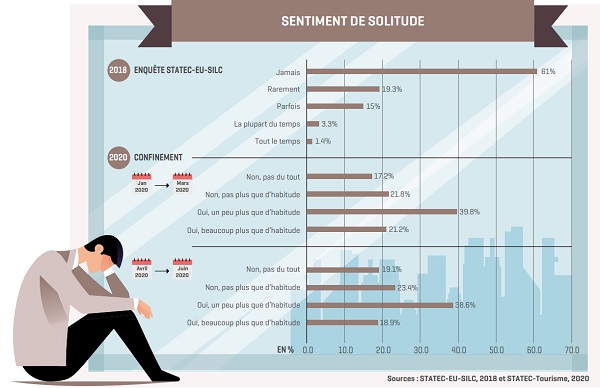 Credit: STATEC
Credit: STATEC
In its recent GDP Well-Being 2020 report, STATEC has revealed the negative impact of the COVID-19 pandemic and related restrictions on the well-being of Luxembourg's residents; it also noted that the correlation between well-being and GDP is low.
In addition to the obvious consequences of the pandemic on the economy and people's physical health, the crisis has taken a pyschological toll on the Luxembourg population.
According to the report, lockdown and social distancing measures have seriously disrupted social relations and changed people's connection with the public space. More than 21% and 19% of residents felt very lonely at the start of the lockdown in March and between April and June 2020 respectively. In "normal" times, only 5% of the population experienced loneliness "all or most of the time", according to the 2018 EU survey "SILC".
During lockdown, the feeling of loneliness was stronger among the young and less wealthy. STATEC noted that whilst the impact of reduced social contact on well-being is not clearly established, it would be logical to assume that loneliness or social isolation can affect mental health and thus well-being. People under 35, men, people with lower incomes and students were particularly affected by this feeling of loneliness in 2020, according to the report.
In addition to its impact on social relations, lockdown resulted in lower incomes for some people, thus plunging them into financial difficulties. All of this had an impact on respondents' answers to questions regarding general life satisfaction and feelings of depression before and after lockdown. In the first weeks of the lockdown, one in four residents (regardless of gender) said that their life was less satisfying than before. STATEC asked the same question during the second quarter, which includes both the period of peak hospital admissions (April) and the end of lockdown (May); only 1 in 5 residents admitted to not being satisfied with their life compared to the period before the health crisis. The feeling of life satisfaction thus increased between the start and the end of lockdown, although this trend was only observed among women. The most significant deterioration in life satisfaction was observed among 15-34 year-olds, especially during the first weeks of the lockdown.
STATEC noted that in 2019, well-being had returned to 2010 levels - the highest in the last nine years. In early 2020, before the pandemic broke out in Luxembourg, the Chamber of Deputies (Parliament) debated the well-being of the population and unanimously agreed on the importance of GDP-well-being as a measuring instrument.
An analysis of the Luxemburg Index of Well-being (LIW), which synthesises several dimensions of the quality of life in Luxembourg, showed a decline in well-being from 2011 (three years after the onset of the economic and financial crisis), with well-being in Luxembourg reaching its lowest level in 2013. From there, it increased sharply, and despite a slight decrease in 2017, returned to 2010 levels in 2018 and remained there in 2019. The rise observed from 2014 has been attribued to improved confidence in institutions and an increased feeling of security and human capital through a rise in the proportion of people with higher education. From 2016, the introduction of the indicator on "time spent in activities that you enjoy" showed an increase in this leisure time, which also contributed to the increase in the LIW. The deterioration during this period of the indicator related to income and wealth did not hinder the continuous improvement in well-being, thus indicating the importance of non-financial factors in the evolution of well-being in Luxembourg.
The STATEC report added that there is a real divergence between the evolution trend of the LIW, an indicator of well-being, and GDP per capita, the traditional indicator of economic performance. Since 2010, well-being in the Grand Duchy has seen an overall improvement of 1%, which is low compared to the GDP growth of 29.3% or GDP per capita growth of 12.1% during the same period. The correlation between the two indicators is very weak. The economic projections for 2020 and 2021 and the results of studies on the consequences of lockdown in Luxembourg have led STATEC to believe that the LIW as well as the GDP per capita will deteriorate this year and the next.








